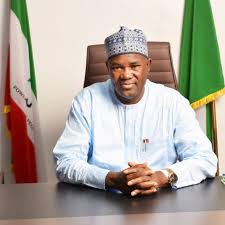The ongoing crisis within the Peoples Democratic Party (PDP) remains unresolved, escalating tensions between factions as key leadership changes occur. On Friday, the integrity faction of the party appointed Yayari Ahmed Mohammed as the acting National Chairman, a decision rooted in the party’s constitutional guidelines. The turmoil within the PDP reached a peak when the National Working Committee (NWC), under acting Chairman Umar Damagum, suspended prominent members, including National Legal Adviser Kamaldeen Ajibade and National Publicity Secretary Debo Ologunagba, citing allegations of anti-party activities. This move contributed to a contentious atmosphere, further complicating the party’s internal politics.
The conflict escalated rapidly when a counter-statement released by Ologunagba claimed the suspension of Damagum and National Secretary Sam Anyanwu from their positions, following the same allegations that had led to the earlier suspensions. This highlights a growing rift within the party, as factions engage in a combative struggle for control. Ologunagba’s assertion of authority for the integrity faction underscores the deep divisions and suggests a significant power struggle that is set to continue in the forthcoming weeks. The clash of leadership claims presents challenges for the PDP, especially as it works to maintain cohesion in preparation for future political contests.
In the wake of these disruptions, Ologunagba emphasized that Mohammed’s appointment is in accordance with the amendments to the party’s constitution established in 2017. This constitutional reference suggests that the integrity faction aims to legitimize its leadership choices, positioning itself as a stabilizing force amid the discord. The call for unity among members, coupled with a focus on upcoming plans for the party’s National Executive Committee (NEC) meeting, reflects a desperate attempt to regain a semblance of order. This NEC meeting, scheduled for October 24, 2024, will be pivotal in determining the PDP’s direction and addressing the underlying issues that have led to the current crisis.
The intense rivalry between competing factions of the NWC marks a significant moment in PDP’s history, revealing broader ramifications within Nigeria’s political landscape. The party’s internal conflict can be seen as reflective of the challenges faced by opposition parties in the country, particularly concerning unity and coherence amidst differing agendas. As factions vie for influence, the risk of splintering increases, which could weaken the party’s overall electoral strength and undermine its ability to present a formidable challenge to the ruling party.
As the situation unfolds, the integrity faction’s leadership will need to navigate the complicated terrain of party politics while attempting to unite its members and appease dissenting voices. With impending elections on the horizon, the importance of maintaining a united front cannot be overstated. The actions taken in the coming weeks regarding party organization, strategy, and candidate selection will be crucial.
Ultimately, the PDP’s future hinges on the resolution of these internal divisions. The appointment of Yayari Ahmed Mohammed may serve as a potential turning point; however, without strategic collaboration among all factions, the party risks remaining mired in conflict. The upcoming NEC meeting will be critical, serving as an opportunity for the PDP to redefine its objectives and chart a path forward, as the integrity faction seeks to establish stability amidst a prevailing atmosphere of uncertainty and division.














